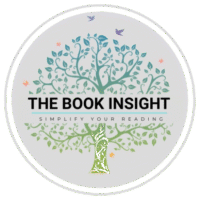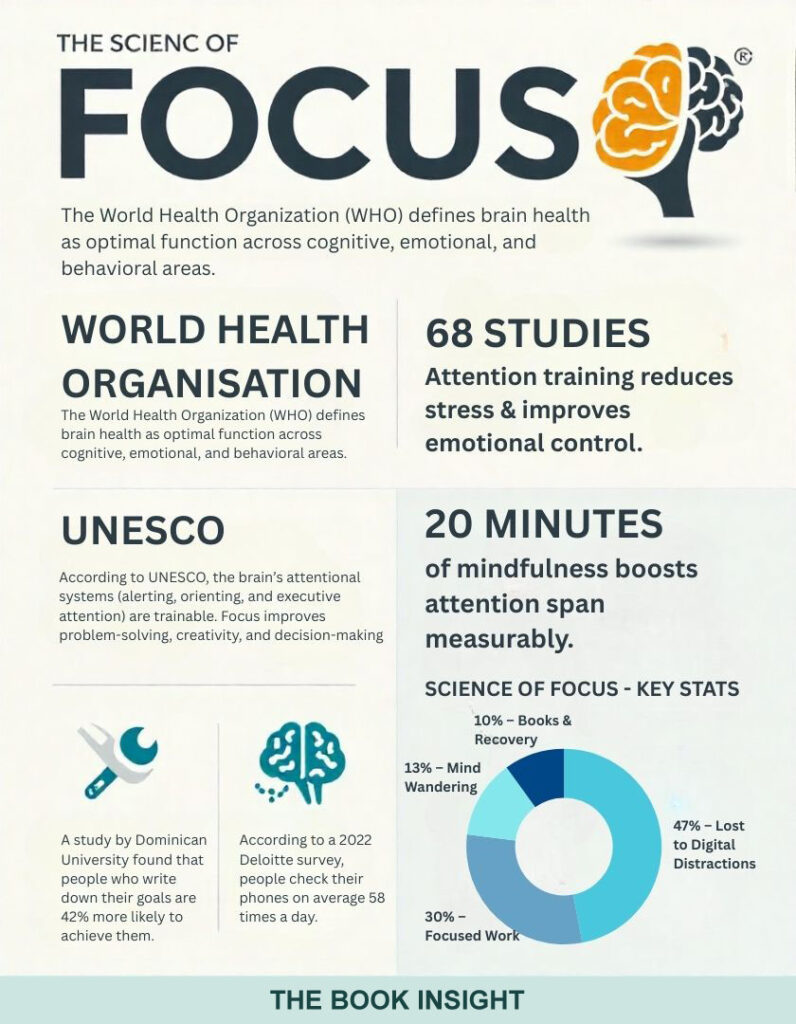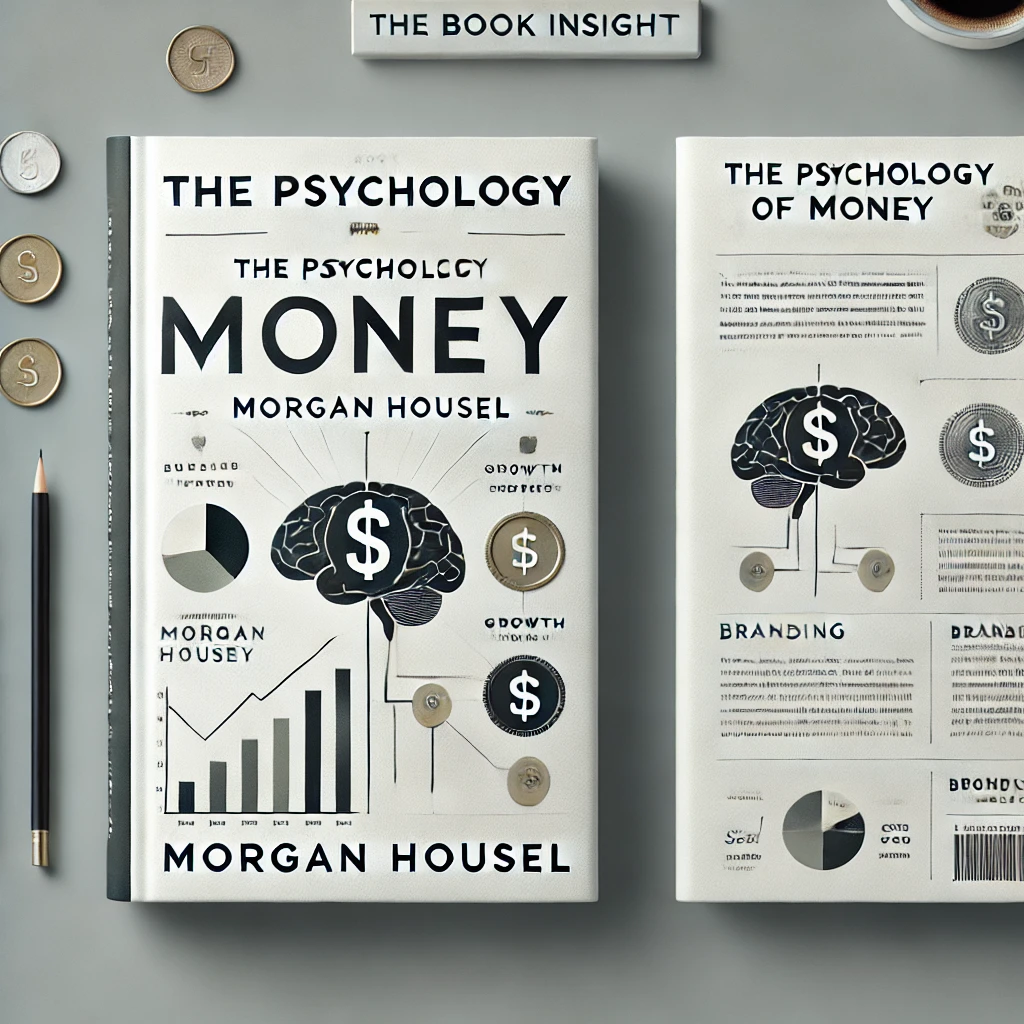Table of Contents
ToggleThe Science of Focus: How to Beat Distraction in the Digital Age
You sit down to work, determined to get things done. But within minutes, a notification pops up, your phone rings, and your focus slips away. Before you know it, you’ve clicked on the alert and completely forgotten the main task you were working on. These small distractions add up, stealing countless hours from our daily routine, lowering productivity, and weakening our ability to stay on track.
In today’s world, we may be more economically advanced than ever, but one hidden truth remains: focus is the new superpower. The very economy of attention fuels billion-dollar industries, running every hour, every minute, and every second we spend online. This is the real science of focus—understanding how our attention is hijacked and learning how to reclaim it.
In this article, we’ll reveal practical strategies, grounded in psychology and real-life examples, to help you sharpen your attention and beat distractions. The goal is simple: stop wasting hours on digital noise and start training your brain to focus on what truly matters.
Why Focus Matters More Than Ever?
In today’s digital era, focus is more valuable than money—it has become the new productivity currency. Every bit of attention you give online is directly converted into profit for someone else. Whether it’s a social media platform, an ad company, or a brand you interact with daily, they all thrive on one thing: your focus. The more you give, the more they earn. But here’s the question—if our attention can make others wealthy, why not redirect it to make our own lives richer?
Shortened attention spans are costing us heavily. Constant distractions lead to poor decision-making, reduced efficiency, and a decline in mental clarity. Studies show that each time we break our focus, our brain takes time to recover, making it harder to improve concentration and perform at our best.
Take this real-life example: Aman, a working professional, carries two phones—one for personal use and one for work. While trying to concentrate on an important project, he’s bombarded with reminders, promotional texts, and social media notifications from both devices. His attention scatters, priorities get mixed up, and at times he even forgets what he was working on. This is the cost of poor attention management—productivity drops, stress rises, and decisions suffer.
The Science Behind Distraction and Focus
Brain’s Dopamine Loop: Why We Crave Notifications
Our brain is wired to seek instant gratification through a dopamine-driven loop. In ancient times, dopamine was essential for survival—it pushed humans to seek food, safety, and rewards. But in today’s digital era, this mechanism is artificially hijacked. Every time we hear a notification ping, dopamine spikes, making us crave the quick reward of checking it. Whether it’s a like on social media, a text, or a breaking news alert, the brain constantly urges us to respond. This explains why many people struggle to beat distractions and end up losing valuable hours to meaningless scrolling.
Role of the Prefrontal Cortex in Attention
The science of focus goes deeper into how the brain works. The prefrontal cortex acts as the brain’s “control center,” helping us filter important information while ignoring the noise. For example, when searching for a friend in a crowd, the prefrontal cortex allows you to focus only on faces rather than irrelevant background details. It also manages inhibitory control—the ability to resist temptations, like checking your phone during work. Without strong prefrontal regulation, distractions easily take over, lowering productivity and decision-making power. Strengthening this ability is key if you want to improve concentration and direct your attention toward meaningful goals.
Deep Work: The Antidote to Digital Distraction
Cal Newport, in his book Deep Work, explains that meaningful success requires long stretches of uninterrupted focus. Shallow, distracted work may keep us busy but rarely creates impact.
Take the example of two students:
- Student A keeps his phone nearby while studying. Every notification pulls his attention, and soon, he spends hours switching between social media, Netflix, and games. Over time, his sleep suffers, his eyes develop dark circles, and his focus weakens.
- Student B, however, locks away his phone during study sessions and daily routines. He is fully present while reading, eating, or playing sports. This discipline allows him to stay energized, develop clarity of thought, and get more done in less time.
This contrast proves that the science of focus isn’t about working harder but about designing an environment where it’s easier to beat distractions and improve concentration consistently.
10 Proven Ways to Beat Distractions and Train Your Focus
In today’s digital age productivity depends less on how much time you spend working and more on how well you manage your science of focus. With constant notifications, endless social media feeds, and multitasking habits, it has become harder than ever to improve concentration. But research-backed methods and mindful practices can help you beat distractions and reclaim your attention.
1. Set Clear Priorities Daily
Most distractions creep in because we don’t know what to focus on. The “Rule of 3” is simple—write down the 3 most important tasks for the day and complete them one by one before moving to anything else.
Science Fact: A study by Dominican University found that people who write down their goals are 42% more likely to achieve them.
Example: Top CEOs and leaders start their day by listing and committing to their top 3 outcomes.
2. Use Time Blocks (Pomodoro Technique)
The Pomodoro Technique (25 minutes focused work + 5 minutes break, repeated 4 times) helps train your brain for deep concentration.
Science Fact: Research from the University of Illinois shows that short breaks between work sessions help maintain consistent productivity.
Example: Writers, programmers, and coders often rely on this method for long hours of deep work without burning out.
3. Control Your Digital Environment
Your phone is the biggest enemy of focus. Turn on “Do Not Disturb,” mute notifications, or use apps like Freedom or Forest.
Science Fact: According to a 2022 Deloitte survey, people check their phones on average 58 times a day.
Example: Leaving your phone in another room instantly boosts focus for priority work.
4. Practice Single-Tasking, Not Multitasking
Studies prove multitasking lowers IQ temporarily, increases mistakes, and takes 40% longer to finish tasks.
WHO Data: Distracted driving (often due to phones) causes over 1.3 million deaths globally each year.
Example: Just as you can’t safely drive while texting, trying to “multitask” at work ruins true efficiency.
5. Train Your Brain with Meditation & Mindfulness
Just 10 minutes of meditation daily can rewire the brain for better focus and concentration.
Science Fact: Harvard researchers found that mindfulness increases gray matter in the prefrontal cortex—the part of the brain responsible for decision-making and focus.
Example: Global giants like Google and Intel run mindfulness programs for employees to boost digital age productivity.
6. Guard Your Energy (Sleep & Diet)
Sleep deprivation reduces cognitive performance as much as alcohol does. Diets high in sugar and junk food also cause brain fog.
WHO Warning: More than 60% of young adults are losing sleep due to late-night social media and gaming.
Example: Instead of extra caffeine, a 20-minute nap improves alertness, memory, and concentration far better.
7. Use the “2-Minute Rule” for Quick Tasks
If a task takes less than 2 minutes, do it immediately instead of letting it pile up. This prevents mental clutter.
Science Fact: Psychologist David Allen (author of Getting Things Done) notes that unfinished tasks create “open loops” that drain focus.
Example: Reply to quick emails instantly rather than bookmarking them—your mind stays lighter and sharper.
8. Optimize Your Workspace
A cluttered desk = a cluttered mind. Minimal setups encourage calm and focus.
Science Fact: Princeton Neuroscience Institute found that physical clutter competes for your attention, reducing focus.
Example: Writers often choose libraries or silent cafés to escape digital chaos and boost attention span.
9. Train with “Focus Exercises”
Like muscles, focus strengthens with practice. Try reading 20 pages daily without touching your phone. Start small and increase gradually.
Science Fact: Darren Hardy in The Compound Effect highlights consistency as the real secret to lasting focus.
Example: Athletes train mental focus before major competitions—professionals visualize success to improve real-world performance.
10. Reward Yourself for Deep Work
The brain loves dopamine rewards. By promising yourself a treat after a focus session, you train your mind to enjoy deep work.
Science Fact: Neuroscientists confirm that small rewards release dopamine, reinforcing productive behavior.
Example: Finish your big task first, then allow yourself 20 minutes of Netflix or gaming as a reward.
Key Takeaway:
Beating distractions is not about working harder but about working smarter. By combining science-backed techniques with consistent practice, you can reclaim your focus, master the science of focus, and achieve digital age productivity in a world full of noise.
Long-Term Benefits of Building Focus
In today’s digital age productivity is under constant attack from distractions, but developing long-term focus transforms not only your work but your entire life. Focus is like a mental muscle — the more you train it, the stronger it gets. Here’s how:
1. Cognitive and Neurological Benefits
- Improved Brain Function – Harvard studies show that mindfulness and focus-based practices enhance attentional control and efficiency. USC research found even 30 days of meditation improves reaction time and reduces distractions.
- Neuroplasticity in Action – The science of focus proves attention isn’t fixed. Regular practice rewires the brain, boosting concentration, decision-making, and even IQ levels.
2. WHO Insights on Brain Health
The World Health Organization (WHO) defines brain health as optimal function across cognitive, emotional, and behavioral areas. Focus and attention sit at the core of this definition. WHO highlights that sustained attention drives lifelong learning, emotional stability, and stronger social connections — all essential for overall wellbeing.
3. Educational and Developmental Impact
- Trainable Attentional Networks – According to UNESCO, the brain’s attentional systems (alerting, orienting, and executive attention) are trainable. Focus improves problem-solving, creativity, and decision-making.
- Closing Socioeconomic Gaps – Even children under environmental stress can enhance focus with structured training, showing how powerful attention is as a skill.
4. Mental Health and Emotional Regulation
- Focus reduces mind-wandering, stress, and anxiety while improving resilience.
- A meta-analysis of 68 studies with 10,000+ participants shows that consistent focus-building practices directly improve emotional regulation.
5. Real-World & Career Benefits
- Professionals who beat distractions achieve higher productivity, make better decisions, and avoid costly errors.
- Leaders with strong focus gain clarity, manage crises effectively, and inspire confidence in their teams.
Real Example: Consider a manager who cuts off unnecessary notifications, dedicates deep work sessions, and practices mindfulness. Over time, they report fewer mistakes, better team communication, and faster career growth compared to colleagues constantly interrupted by pings and alerts.
Key Takeaway: The science of focus proves that when you deliberately train your attention, you improve concentration, strengthen mental health, and unlock long-term growth — in relationships, career, and personal wellbeing.
Conclusion: The Power of Focus in the Digital Age
In today’s hyperconnected world, distractions are everywhere — from constant phone notifications to endless scrolling on social media. But mastering the science of focus is no longer optional; it’s the foundation of digital age productivity. When you train your mind to improve concentration and actively work to beat distractions, you unlock long-term benefits for your brain, career, relationships, and overall well-being.
Scientific research and global studies by institutions like Harvard, WHO, and UNESCO confirm that attention is not fixed — it is trainable. By rewiring our attentional networks and practicing sustained focus, we enhance decision-making, boost efficiency, and even reshape our brain for resilience and growth.
Ultimately, focus is more than a productivity tool; it is your personal power. Every minute of attention you reclaim for yourself is an investment in your goals, your health, and your future. In the digital economy, attention is currency — so spend it wisely.
✅ Stay consistent.
✅ Practice mindfulness.
✅ Reclaim your focus, and watch your potential multiply.
🔗 Related Articles You May Like
1. The Science of Happiness: Unlocking the Secrets to a Fulfilling Life
Discover how happiness and focus are deeply connected, and why a positive mind boosts attention and productivity.
2. Dopamine Detox 2025: Reset Your Brain for Maximum Focus
Learn how cutting back on overstimulation helps you regain control of your attention and fight distractions.
3. Overthinking: Understanding the Mental Loop
Uncover how constant overthinking drains your focus and proven strategies to break free from the mental cycle.
4. Best Books on Focus and Attention in 2025
A curated list of powerful books to sharpen your concentration and beat modern distractions.
5. Top 5 Books on Mental Wellness in 2025
Explore the most impactful books that combine mental clarity, emotional health, and focus mastery.
6. Hyperfocus Book Summary: Unlocking Deep Concentration
Learn key lessons from Chris Bailey’s Hyperfocus on how to channel your mind toward what truly matters.
7. Deep Work by Cal Newport: The Power of Undistracted Success
Understand the framework behind achieving more in less time through distraction-free work.



